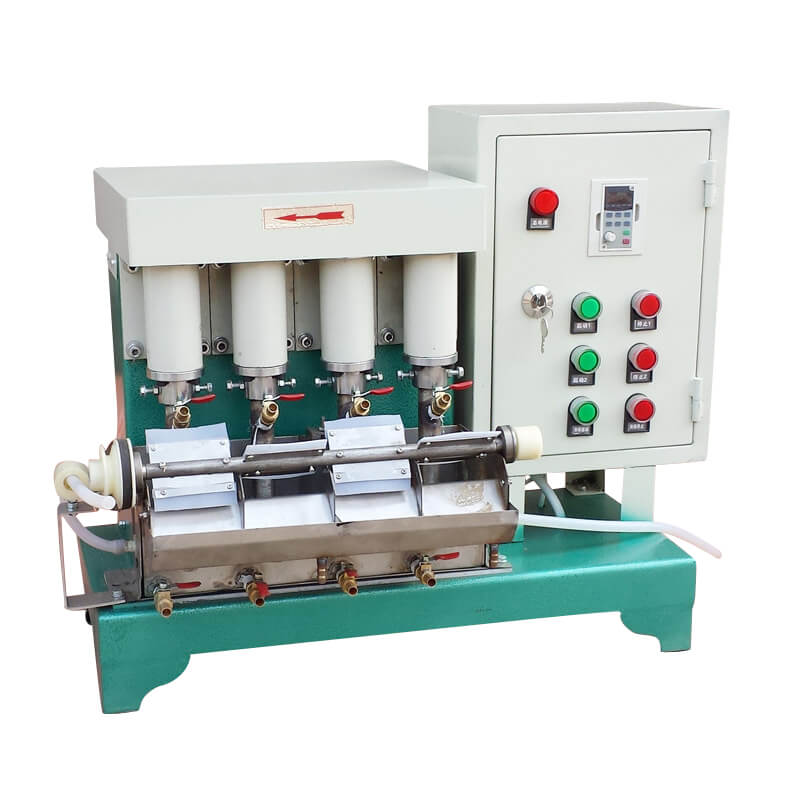Planetary Ball Mill Operation
Planetary Ball Mills enable the convenient programming of the following grinding parameters:
- Grinding duration in hours and minutes
- Speed
- Speed ratio (speed sun wheel : grinding jar)

Features and benefits
- High efficient fine grinding up to end fineness <1µm
- Different speed ratios available
- Grinding jars from 125ml to 500 ml in different materials
- Suitable for long-term trials and continuous use
- Automatic direction reversal to avoid agglomerations
- Reproducible results due to progr. grinding parameters
- CE – certified
Grinding jars
The selection of the right grinding jar and the correct filling level has a big impact on the grinding result. According to the application you have to select the correct material and amount/volume for the grinding jar and the grinding balls.
A jar filling should consist of about 1/3 sample and 1/3 ball charge. The remaining third is the free jar volume that is necessary for the movement of the balls. The following table provides recommendations.
Selection guide for grinding jars and balls

Grinding jars available with different liner:
- Stainless steel

- Hardened steel
- Tungsten carbide
- Agate
- Sintered corundum
- Zirkonium oxide
Features of grinding jars
The grinding jars are built from one block of steel or built with a stainless steel protective jacket with liner from the above materials.
Unique advantages of LAARMANN grinding jars:
- Safe according to stainless steel protective jacket
- Easy opening according to gap between lid and jar
- Self-centring base of grinding jar
- Gas-tight and dust-proof sealed by O-ring
- Labelling field (e.g. for sample information)
Planetary Ball Mill Applications

- Floors
- Wood fibres
- Plant Materials
- Seeds
- Tobacco
- Betonite
- Concrete
- Gypsum
- Sand
- Stone
- Cement clinker
- Hair
- Bones
- Tissue
- Carbon fibres
- Paints and lacquers
- Catalysts
- Plastics
- Pigments
- Polymers
- Cellulose
- Glass
- Hydroxylapatite
- Kaolin
- Ceramic oxides
- Quarz
- Clay minerals
- Ores
- Semi-precious stones
- Cole
- Coke
- Alloys
- Metal oxides
- Quarz
- Slags
- Electronic scrap
- Sludges
- organic and unorganic waste
Planetary ball mill is a very often used machine for mechanical alloying, especially in Europe. Because very small amount of powder (for example, as little as a few grammes), is required, the machine is suitable for research purposes in the laboratory. A typical planetary ball mill consists of one turn disc (sometimes called turn table) and two or four bowls. The turn disc rotates in one direction while the bowls rotate in the opposite direction. The centrifugal forces created by the rotation of the Mechanical Alloying.

A short milling duration of only 30 to 60 min. In cases where relatively high temperature is necessary to promote reaction rate, even this may be an added advantage to the process. In addition, the planetary ball mill may be modified by incorporating temperature control elements.
Two types of bowls are commercially available: steel including hardened chrome steel, stainless CrNi-steel and hardmetal tungsten carbide (WC+Co) and ceramic bowls including sintered corundum (Al2O3), agate (SiO2) and zirconium oxide (ZrO2). They generally are available in three different sizes of 80, 250 and 500ml. For high energy mechanical alloying, however, steel bowls are recommended since ceramic bowls can cause contamination due to minute chipped off or fractured particles from the brittle surfaces of the milling bowl and balls. Generally, bowls and balls of the same material are employed in the mechanical alloying process to avoid the possibility of cross contamination from different materials.
Based on powder particle size and impact energy required, balls with size of 10 to 30 mm are normally used. If the size of the balls is too small, impact energy may be too low for alloying to take place. In order to increase impact energy without increasing the rotational speed, balls with high density such as tungsten balls may be employed. Table 2.1 gives the recommended number of balls per bowl to be applied.









































